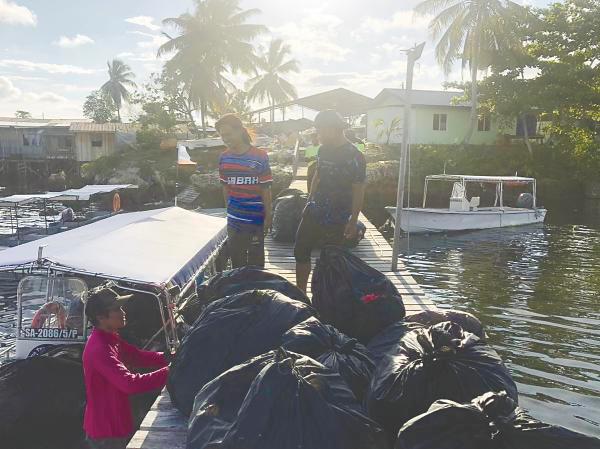WWF-Malaysia commends the Sabah state government for its commitment to reducing single-use plastic in Kota Kinabalu through the “Bawa Beg Bah’”(3B) campaign, especially in the face of widespread plastic pollution.
Plastic production has increased drastically over the last seven decades, with over 450 million tonnes produced globally.
Plastic is now ubiquitous, used in everything from construction and food packaging to medical instruments.
Single-use plastic bags make up the bulk of plastic waste produced globally. The large volumes of single-use plastic waste pollute major water sources and waterways, and ultimately end up in the ocean.
The breakdown of improperly discarded single-use plastic bags releases microplastic particles, which pose serious risks to human health and wildlife. These particles are pervasive in the environment, especially in marine ecosystems.
Furthermore, single-use plastic waste poses a threat to marine species and disrupts the marine food chain.
A recent study by Cornell University revealed that Malaysia, along with the Philippines and Indonesia, tops the global per capita list for microplastics consumed in food. This is a concern for the public and the government.
WWF-Malaysia’s preliminary gap analysis on Sabah’s plastic waste management highlights the challenges faced by the state government due to the widespread use of single-use plastics and limitations in current solid waste management systems.
The analysis indicates that plastic waste pollution in Sabah is significantly influenced by opportunities for improvement within existing laws and policies.
These include potential for more comprehensive provisions for waste minimisation and the development of a more integrated policy to facilitate effective waste disposal.
The 3B campaign aligns with WWF-Malaysia’s Goal Number Eight: No Plastic in Nature. This goal seeks to reduce and reuse plastic, and eliminate plastic leakage into nature – particularly in sensitive marine environments such as Semporna – and enhance the capacity of local coastal communities to manage plastic waste.
It also advocates for policies that minimise plastic waste while promoting sustainability and economic circularity.
“With the increasing amount of plastic waste ending up in our oceans, harming human and wildlife and leaching toxins into our environment, the ban on single- use plastic is not only an environmental necessity but also a moral obligation,” said executive director and CEO of WWF-Malaysia Sophia Lim.
WWF-Malaysia is empowering local coastal communities to manage their own plastic waste through various capacity-building workshops. Up until June, 3,370.3kg of waste was removed through community waste management systems on Omadal and Larapan islands, in collaboration with community-based organisations such as Wanita Pulau Omadal, Iskul Sama DiLaut and Larapan Youth Conservation Group.
However, WWF-Malaysia believes that immediate and concerted efforts from the government and industries are also necessary to protect human health and the environment.
The time to address single-use plastics is now. WWF-Malaysia urges authorities to prioritise the planet’s future by implementing a nationwide ban on single-use plastics.
The 3B campaign is a positive step toward achieving a future with “No Plastic in Nature”.
World Wide Fund for Nature Malaysia









